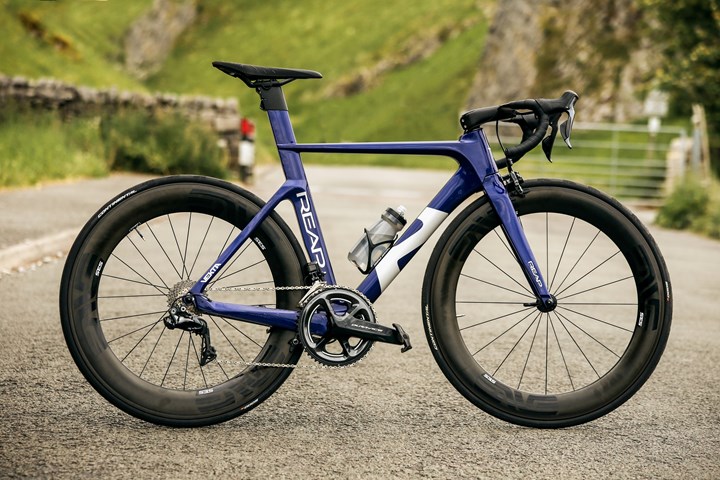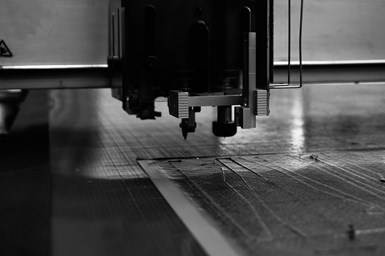Kamm Projects launches carbon fiber aero-road bike
U.K.-based composites company combines passion with decades of industry experience to develop a next-gen bike that offers more stiffness, speed, comfort, efficiency, precision and response.

REAP Vekta aero-road bike. All photo credit: Kamm Projects Ltd.
Kamm Projects Ltd (Newcastle, U.K.), a company that specializes in the manufacture of composite, polyurethane and fiber-reinforced materials for a wide range of industries, reports that it is looking to the future after the launch of its U.K.-made carbon fiber Vekta aero-road bike through sister company REAP Bikes. Offering what is said to be next-generation frame performance, the bike is designed for racers, triathletes and road riders who want more stiffness, speed, comfort, efficiency, precision and response to their equipment.
Kamm Projects has undertaken a number of high-profile, highly technical projects, such as the Gibbs Humdinga amphibious vehicle — which applied carbon fiber prepreg with an infusion process for the vehicle’s structural components — as well as for a range of high-end manufacturers, such as Bentley Motors, which incorporated structural reaction injection molding for the automotive interiors.
The creation of REAP in particular, however, came about when REAP Founder and Managing Director, Martin Meir, felt the cycling industry had headroom for a range of precision-engineered, high-performance bikes made with uncompromisable materials and methods that big brands deem too expensive for mass production. Meir brings decades of experience in advanced composite engineering and is also a former elite triathlete, still competing as an amateur.
“We’re at a position to use 30 years of composite engineering experience to develop a world-class company,” Martin says. “This I believe in, as U.K. manufacturing needs to do something to put it back on the right path.”

To achieve high speed, the Vekta uses truncated airfoils — also known as Kamm-tails — which reportedly make the airflow behave as if it were following a long, traditional airfoil. The air continues to flow smoothly once it has passed the frame and it meets again as if it had followed a complete airfoil, minimizing turbulence and drag. In lieu of complete airfoils, the truncated versions also are said to be lighter, more compliant to bump forces and stiffer laterally against pedaling forces.
The Vekta’s downtube also features a “trip,” or a sharp crease that’s precisely placed and angled to influence the airflow to follow the virtual airfoil shape. Other features that contribute to Vekta’s speed include:
- Reduced frontal area, achieved by the flat toptube and dropped seatstays.
- Reduced turbulence and pressure spots via wide stand fork and the dropped seatstays.
- A wheel-hugging downtube and seat-tube for smoother airflow, which transition the air more cleanly between the wheels and frame.
- Optimized tube profiles for the use of wider wheels with widths of 25-28 millimeters.
With experience in a wide range of materials and processing options that can be used to meet clients’ requirements, Kamm Projects notes that its team is capable of pursuing an idea from its inception to the final product.
In addition to carbon fiber capabilities, the company has also incorporated glass fiber-reinforced polymer (GRP) panels via resin transfer molding (RTM) for Modec cab project and infusion for the hull of a Gibbs Aquada amphibious vehicle. Ultimately, the company says, at the heart of its achievements, is the combination of engineering best practices with high-quality engineering minds.
Related Content
-
Composites manufacturing for general aviation aircraft
General aviation, certified and experimental, has increasingly embraced composites over the decades, a path further driven by leveraged innovation in materials and processes and the evolving AAM market.
-
The lessons behind OceanGate
Carbon fiber composites faced much criticism in the wake of the OceanGate submersible accident. CW’s publisher Jeff Sloan explains that it’s not that simple.
-
PEEK vs. PEKK vs. PAEK and continuous compression molding
Suppliers of thermoplastics and carbon fiber chime in regarding PEEK vs. PEKK, and now PAEK, as well as in-situ consolidation — the supply chain for thermoplastic tape composites continues to evolve.












.jpg;maxWidth=300;quality=90)


